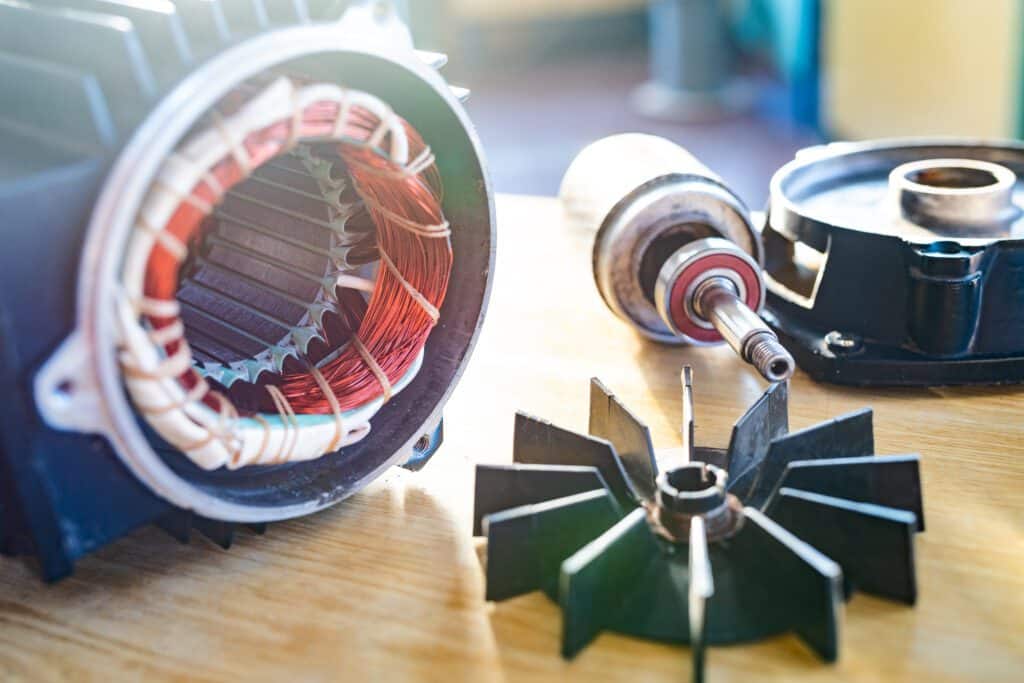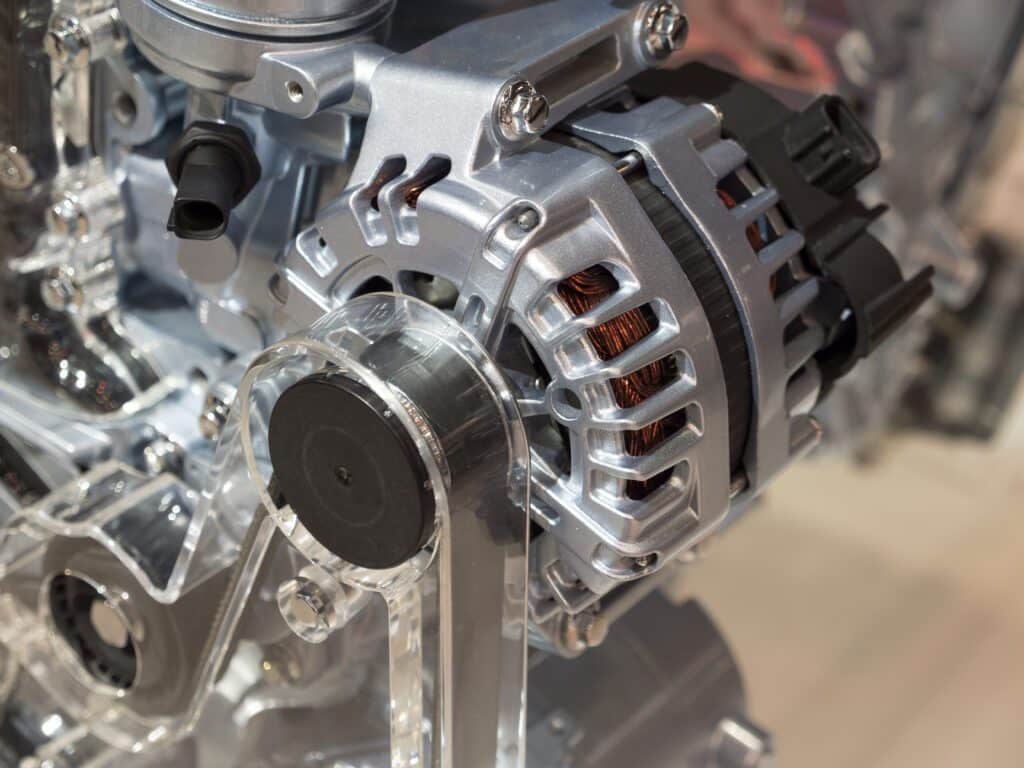
Alternator 101: Essential Methods on How to Test Your Alternator and Keep Your Car Running Smoothly
Knowing how to test your alternators is essential for keeping your car running well. The alternators is integral to your car’s electrical system, as it powers the battery and other parts. When your vehicle’s alternator starts to fail, it can lead to severe issues, like getting stuck on the road or facing expensive repairs.
That’s why it’s so crucial to catch alternators problems early. At Express Auto Irving, we understand how vital it is to spot these issues right away, and this guide will show you how to do just that.
5 Common Signs of a Bad Alternators
The first step in knowing how to test your alternators is recognizing the signs of bad alternator. Here are five frequent indications to look for:
Dim Headlights:
If your car’s headlights are dim or flickering, it could be the first signs of a bad alternator. The alternator could be struggling to give enough power, especially when driving at night or in bad weather.
Strange Noises:
A failing alternator often makes strange noises like growling or whining. This could be due to worn-out parts inside the alternator.
Electrical Issues:
If your car’s radio, power windows, or other electrical parts start acting up, the alternators might be the cause. The alternator should keep the battery charged and power all your car’s electrical systems.
Battery Warning Light:
If the battery warning light appears, the alternators is not charging the battery properly. This light is a sign that something’s wrong with the charging system.
Stalling Engine:
If your engine stalls unexpectedly, it might be because the alternators isn’t providing enough power. This can often be confused with a bad battery, but it’s a common alternator issue.
These bad alternator symptoms can sometimes look like bad battery problems, so it’s essential to test your alternator to be sure. Understanding these signs of a bad car battery vs alternator can help you catch alternator issues early and avoid bigger problems.
How to Test Your Alternator with a Multimeter
Testing your alternators with a multimeter is one of the most reliable ways to determine whether it’s working correctly. This guide will help you understand how to test your alternator and decide whether or not it’s the alternator or battery that’s causing the problem.

Set Up the Multimeter:
First, set your multimeter to measure voltage. This tool will help you check the alternator’s output and see if it’s within the correct range.
Check Battery Voltage:
Before starting your car, connect the multimeter to the battery to measure the voltage. A good and healthy battery should read around 12.6 volts. This step is essential to make sure your battery has enough charge before testing the alternator.
Start the Engine:
Once you start the engine, measure the voltage again. A good alternator should show a reading between 13.8 and 14.4 volts. If the voltage is too low or too high, it could be a sign of a problem with the alternator.
Test Under Load:
Turn on your headlights, radio, and other electrical components to put a load on the alternator. The voltage should remain steady, ideally staying within that 13.8 to 14.4 volts range. If the voltage drops significantly when you do this, it may be a sign of alternator failing.
This procedure is a simple way to see if your alternator is working properly. Knowing how to test your alternator voltage prevents you from guessing if the problem is with the alternator or your car’s battery. Regular inspections like this might help you dodge unexpected problems and expensive repairs.

Diagnosing the Alternator vs. Battery Problem
Figuring out whether the problem is with your alternator or battery can be tricky, but understanding the differences can help you make the right diagnosis. Here are some pointers that will help you determine the cause:
Battery Check:
Start by checking your battery. If your battery is more than three years old, it could be wearing out. However, if you’ve recently replaced the battery and are still facing issues, your alternator might be the real problem. Symptoms of alternators going bad can sometimes mimic battery problems, so it’s important to check both.
Jumpstart Test:
A simple way to test the alternators is by doing a jumpstart. If your car starts after a jump but dies shortly after, it’s likely an alternator issue. The alternator should keep the car running once it’s started. If it can’t, the alternator may not be charging the battery properly, which is a key sign of a failing alternator.
Warning Lights:
Pay close attention to your dashboard warning lights. If the battery light remains on after the car has started, it’s usually a sign of an alternator problem. The battery light is part of your car’s early warning system, letting you know that the alternator might not be working correctly.
By understanding the difference between symptoms of bad alternators and battery issues, you can more accurately diagnose the problem and take action. Knowing how to tell if alternator is bad and identifying these signals can save you time and money.
3 Alternative Ways to Test Your Alternators
While a multimeter is a reliable method to test your alternators, there are other ways to check if it works properly. Here are three alternative methods:
Headlight Test:
One simple way to test your alternator is to turn on your headlights. While your car running, turn on the headlights. If they dim or fluctuate when you rev the engine, it could mean that your alternator is struggling to provide enough power. This occurs because a failing alternators can’t keep up with your car’s electrical needs.
Noisy Alternator Test:
Pay close attention for any strange noises coming from the alternators area. If you notice or hear a whining or grinding noise, it could be a sign that your alternator is on its way out. These noises often occur due to worn-out bearings or internal components inside the alternator.
Battery Disconnect Test:
This test should be used cautiously and is not recommended for newer cars. Disconnect the battery while the engine continues to run. If the engine stalls immediately, it’s likely bad alternator signs. This test works because the alternator should be able to keep the engine running without the battery’s help. However, this method can be risky and may cause damage to modern vehicles’ electrical systems, so it’s best used as a last resort.
These methods can give you a good idea if your alternators is failing, especially if you don’t have access to specialized tools. However, they are not as reliable or accurate as using a multimeter. Knowing how to tell if alternator is broken with different methods can help you identify issues early, preventing more serious problems down the road.
How to Handle an Alternators That Doesn't Pass the Test
If your alternator fails the test, it’s important to act quickly to prevent further issues. Here’s what you should do:
Stop Driving:
If your alternator is failing, it’s best to stop driving immediately. A bad alternator can drain your car’s battery, leading to a total loss of power. Driving with a bad alternator can also damage other parts of your car’s electrical system, such as the radio, headlights, or the engine itself.
Seek Professional Help:
The next step is to get your car to a trusted mechanic. At Express Auto Irving, our experts can confirm whether your alternator is the problem and perform any necessary repairs. We use reliable methods to diagnose issues with the alternator and the battery to ensure your car runs smoothly.
Consider a Replacement:
If your alternators is beyond repair, the best option is replacing it. A new alternator will restore proper function to your car’s electrical system and prevent further breakdowns. A failing alternator can’t provide the voltage to keep your battery charged, leading to more frequent stalling and other electrical problems. At Express Auto Irving, we can help you choose the right replacement alternator to get your car back on the road safely.
Understanding how to test your alternators and taking the right steps if it fails can save you from costly repairs and unexpected breakdowns. At Express Auto Irving, we keep your vehicle in top shape, offering professional services to handle any alternator vs battery issues you might encounter.
4 Preventative Maintenance Tips for Your Alternator
Taking care of your alternator is vital to evading unexpected breakdowns. Here are four simple tips to keep your alternator in good shape:
Regular Inspections:
During routine car check-ups, ask your mechanic to look at your alternator. Spotting problems early, like loose or worn-out parts, can prevent bigger issues later.
Keep Your Battery Healthy:
A weak battery can overwork your alternator, causing it to fail sooner. Check that your battery is in excellent condition. If it’s over three years old, think about replacing it to ease the strain on your alternator.
Check Electrical Connections:
Loose or dirty connections can cause your alternators to perform poorly. Regularly check the electrical connections to your alternator to ensure they are clean and tight.
Avoid Overloading Your Electrical System:
Your alternator is built to handle a certain amount of power. Adding too many gadgets, like high-power stereos or extra lights, can overwork your alternator, so be careful with how much you add to your car’s electrical system.
These maintenance tips can help extend your alternator’s life and reduce the risk of unexpected alternator problems. At Express Auto Irving, we’re here to help with all your alternator and battery needs.
Final Thoughts: Keeping Your Car Running Smoothly
Understanding how to test your alternator and identifying the different signs of a bad alternator can help you avoid expensive repairs and breakdowns. At Express Auto Irving, we’re committed to helping you keep your car in top condition. Whether you need a quick check-up or a complete repair, our team is here to assist you. Don’t wait until it’s too late—take action today to ensure your car stays on the road.

FAQs
How to know if my alternator is bad?
Look for dim headlights, strange noises, electrical issues, a battery warning light, or engine stalling.
What is the primary function of an alternator?
While your car’s engine is running, the alternator charges the battery, and it powers the electrical systems.
How can I test my alternator with a multimeter?
Measure the battery voltage before and after starting the engine, and check for a reading between 13.8 and 14.4 volts.
What should I do if my alternator fails the multimeter test?
Stop driving, seek professional help, and consider replacing the alternator to avoid further damage.
How can I differentiate between alternator and battery issues?
Check the age of your battery, perform a jumpstart test, and monitor dashboard warning lights for clues.
What are some signs of a failing alternator?
Dim headlights, strange noises, electrical malfunctions, and a battery warning light are common signs.
Can I test my alternator without a multimeter?
Yes, you can use methods like the headlight test, listening for unusual noises, or the battery disconnect test.
How often should I have my alternator inspected?
Regular inspections during routine maintenance can help catch potential issues early.
What should I do if my headlights dim when I rev the engine?
This could indicate a failing alternator. It’s recommended that a specialist check it.
How can a weak battery affect my alternator?
A weak battery can force the alternator to work harder, potentially causing it to wear out faster.
What is the battery disconnect test, and when should I perform it?
This is disconnecting the battery while the engine is running to determine whether the alternator can keep the engine going. Use it as a last resort.
How can I avoid overloading my car’s electrical system?
Be mindful of the electrical accessories you add and ensure they are within the alternator’s capacity.
What should I do if my car frequently stalls?
A stalling engine could indicate a bad alternator. Have it checked by a professional to confirm.
How do I know if my alternator is charging the battery properly?
Check if the voltage reading from your multimeter stays between 13.8 and 14.4 volts while the engine is running.
Why is it important to address alternator issues quickly?
Ignoring alternator problems can lead to more severe damage and costly repairs. Early action can prevent this.
How often should I replace my battery to prevent alternator strain?
Consider replacing your battery every three to five years to avoid overworking your alternator.
What noises indicate a failing alternator?
Whining or grinding noises can be signs that the alternator is malfunctioning.
Can a faulty alternator cause electrical problems in my car?
Yes, a bad alternator can cause issues with your car’s electrical systems, such as the radio and power windows.
How can I ensure my alternator lasts longer?
Follow preventative maintenance tips such as regular inspections, keeping the battery healthy, and avoiding system overloads.
Where can I get my alternator checked or repaired?
For reliable alternator services, visit Express Auto Irving to have your alternator inspected and repaired by experts.
Schedule your alternator inspection today with Express Auto Irving to keep your vehicle running smoothly!

Trusted Company
As a local company, proudly serving Irving, Texas and surrounding areas, Express Auto & Tires is committed to providing excellent services and maintaining our reputation in the area.

Trusted Services
When you hire Express Auto & Tires, you’re hiring a full service Auto Shop Service with the experience and expertise required for all your needs.

Our Team
Our team meets the highest standards in experience and skills. We work hard to ensure our staff are duly trained and remain up to date in the latest trends in the industry.
